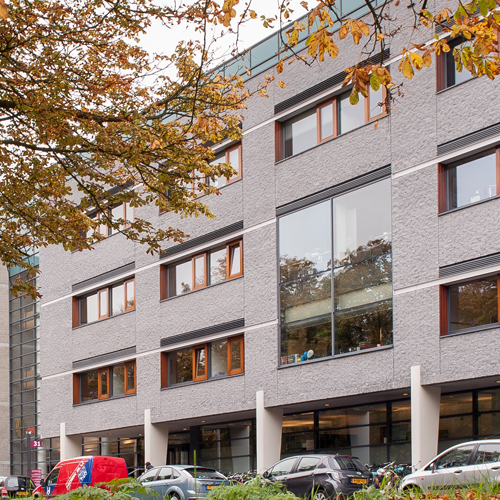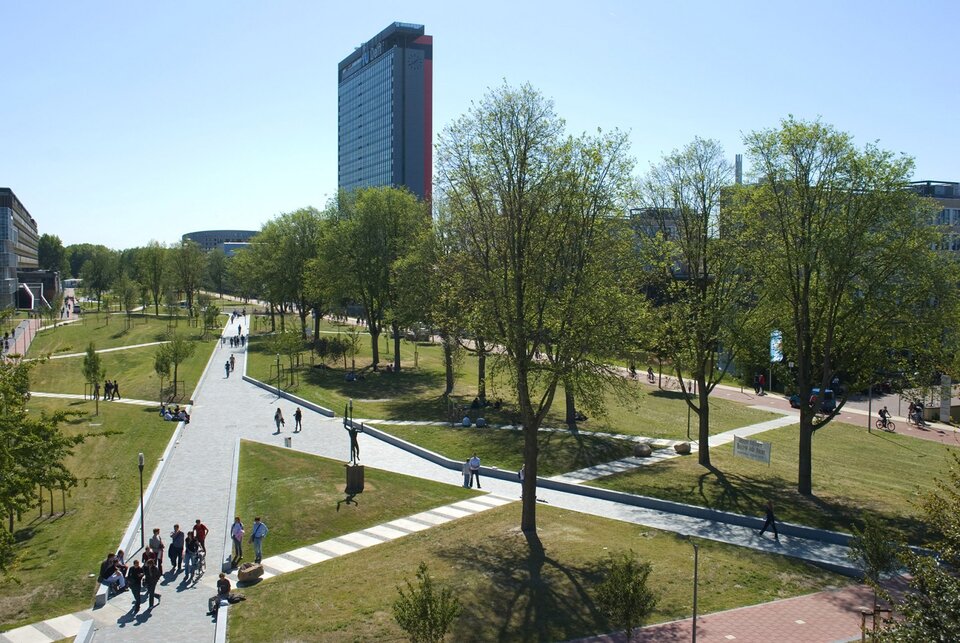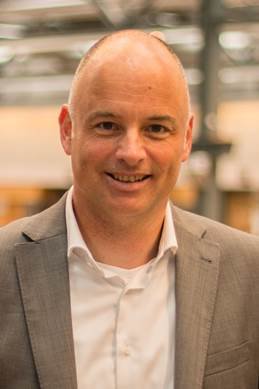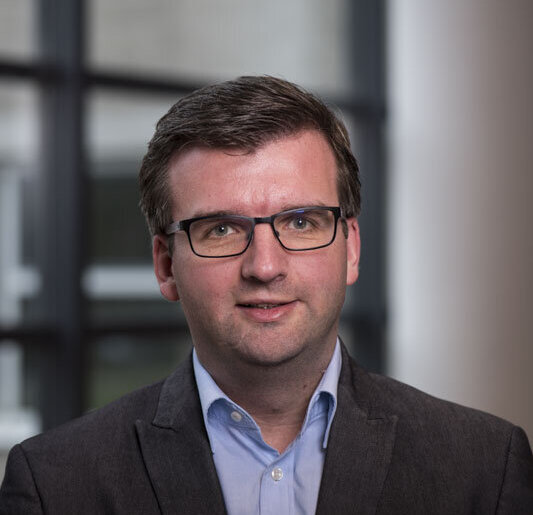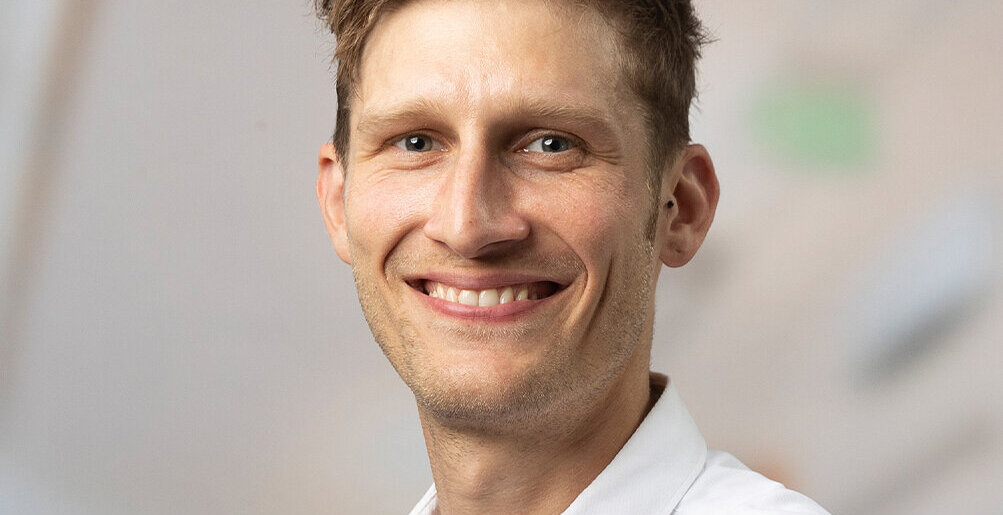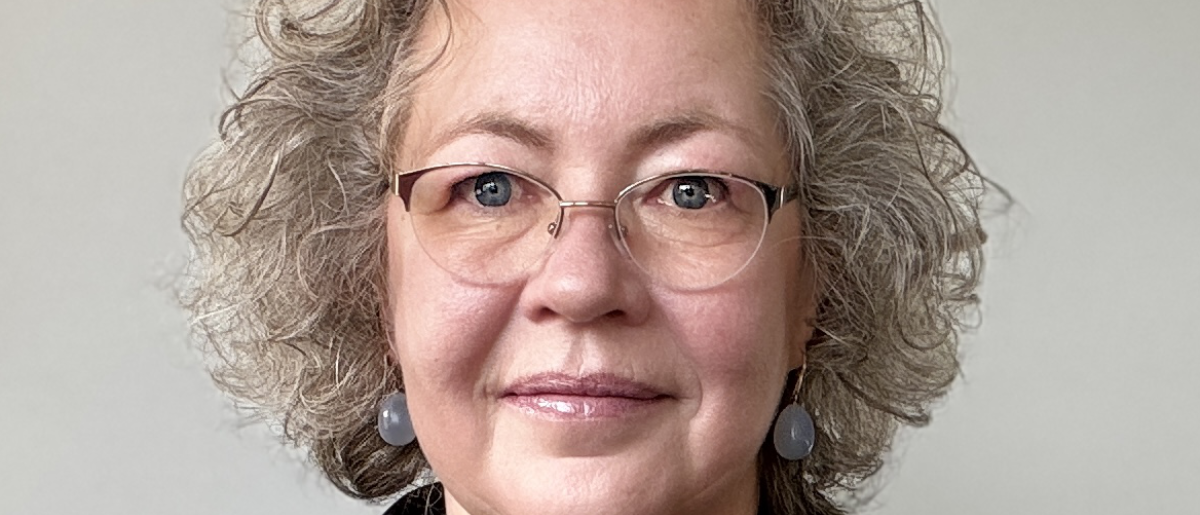TPM Quantum Lab
The Quantum Lab at the Faculty of TPM has as its goal to bring the integrated systems, governance and values perspective of the TPM Faculty into the development of quantum technologies.
At the Faculty of Technology, Policy and Management (TPM) research on quantum technologies has started in the beginning of the 2020s. With initially a focus on ethical, societal, risks and governance aspects (see Projects), soon after work on strategic management and market aspects was added. It is time that the Faculty broadly engages with these new technologies from an integrated systems, actor and value level. Quantum technologies include new forms of computing, communication, modelling and sensing, and are seen as system technologies that will affect the application of other technologies as well as society in general in a wide variety of aspects.
-
TU Delft is leading in research in quantum computing and quantum communication with its QuTech institute and the Faculties of Applied Sciences and of Electrical Engineering, Mathematics & Computer Science. The Faculty of TPM can complement fundamental research at TU Delft. With its focus on exploring and tackling integrated sociotechnical issues TPM can contribute to embedding quantum technologies in society. TU Delft also takes a central role in the national Quantum Delta NL programme (see Box 2) aimed at creating an ecosystem for quantum technologies in the Netherlands. The Quantum Delta NL programme sees quantum technologies as sociotechnical systems, and includes industry, governance, education and society in this ecosystem. TPM is well-positioned to shape and strengthen this growing ecosystem. We are specialised in researching complex sociotechnical systems and can deliver key contributions to the market development of quantum technologies and to their embedding in the wider societal context. It can do so directly by research and more importantly through its education: TPM delivers the future engineers, managers and policymakers who will deal with, and have to function in, domains in which quantum technologies are to be employed.
-
The Quantum Delta NL programme is shaped by societal goals and aims of addressing current societal challenges. It started with goals of bringing economic development, creating a “Quantum Valley” of high-tech innovation in the Netherlands, thus attracting jobs and companies. It envisages to contribute to the world’s efforts towards sustainability, circularity and health, by supporting the energy transition, bringing more efficiency with novel chemical processes and new materials, new medicine and vaccines, and advanced sensory and diagnostic tools.
Yet, like all new technologies, quantum technologies and the governance systems that are put in place to develop them, can also have positive and negative societal impact with potentially far-reaching and widely divergent implications. Furthermore, this impact can be perceived differently by distinct stakeholder groups resulting in many different claims about the risk and value of quantum technologies. Within TPM a system perspective is taken in which all these elements are researched. TPM can contribute to reflect on these ongoing technology and policy development processes as well as support research to study their impact. It can also help develop more
fundamental thinking on the governance of technology development processes, for instance, during the transition from experimental to more commercial phases of quantum technology development. TPM can contribute to research to identify the full breadth and width of societal issues that may be affected by quantum technology development. These issues include economic development and sustainability, but also societal cohesion, diversity, equality, accountability and inclusivity, since the growing research and development efforts and the commercialisation of applications will in turn lead to questions of societal and global accessibility.
The societal context is moreover wider and volatile. Additional initiatives advance further global embedding, as for instance the World Economic Forum that aims at exploring how quantum technologies can contribute to addressing the UN Sustainable Development Goals. Changing international relations and geopolitical competition are eroding the openness of global markets and science research, and confront the development of quantum technologies with issues such as digital security, supply chain autonomy and national technological sovereignty.
The societal context can however also be conservative by resisting the adoption of new technologies, possibly even for good reasons. Existing technical and institutional infrastructures have created a large web of interconnected sociotechnical systems, in which applications of quantum technologies have to be integrated. The Faculty of TPM can study these developments to understand their implications, come up with design interventions for advancing quantum technologies in the desired directions, given the desired values, and reflect on the consequences of this integration. These can feed discussions on how and to what extent quantum technologies can or need to be governed so that they can develop in a meaningful societal way, since we – by our mission – have a strong tradition of analysing and modelling the structure and functioning of these complex sociotechnical systems, and of designing solutions to solve major societal challenges.
-
One of the fascinating yet complex issues is how different quantum technologies evolve over time and what that means in terms of market formation. On a macro level, the evolution paths of different quantum technologies are intertwined, and all of them are influenced by a host of actors, factors and events. These actors, factors and events do no longer fit in a simple market context. Instead different playing fields with their own rules, affect what happens within markets. For example geopolitical changes, big-tech developments, societal opinion formation and political preferences in Europe all represent playing fields that impact market formation. On a micro-level, start-ups and existing companies struggle with how to navigate in such an environment.
TPM can lead in knowledge development and transfer, both on the macro and micro level. On the macro level, the evolution of related technologies can be tracked, the system of actors and factors driving this evolution can be assessed, and policy alternatives and suggestions for regulation designed. Knowledge of innovation and technology development trajectories can enable understanding and governing joint evolution paths involving quantum technologies. These insights can support the development of the strategic agenda of Quantum Delta NL. On the micro level, TPM researches strategies, business models and growth paths for individual companies. As a Faculty we can help shape the answers for a range of related questions, such as ‘How to formulate different applications for quantum technologies?’; ‘How to select the applications with the highest potential’, and ‘How to envision a range of subsequent applications?’. For example, currently a complete range of sensor technologies is developed within Quantum Delta NL, including possible use-cases. Yet, the formulation and selection of applications is not just an activity at the end of such scientific research. Instead, knowledge of the relative potential of applications should shape the order and focus of research on sensor technologies.
-
New technologies like quantum technologies come with new possibilities, as well as new risks. Quantum computers for instance promise computational power that can be used to run complex
algorithms for studying genetic diseases. But this computational power can also to employed to break cryptographic encryption technologies used to secure digital information sharing in many sectors, including banking, government, defence, telecom and so on.
Current research led by TPM in the HAPKIDO consortium (see Projects) reveals the complexity of transitioning to a quantum safe society and the need for collective action. The preliminary HAPKIDO studies reveal that the impact of a poor governance can be devastating. In HAPKIDO instruments and tools for design and policy interventions are developed. Digital services in government, banking and telecom will not be secure anymore. Accordingly, maximizing the potential, while minimizing the risks requires a more fundamental perspective on the governance of the development of quantum technology.
One of the research directions is the collaborative governance of quantum technologies and transitions. The current approach of Quantum Delta NL is strong. However, there are some blind spots, including an internal focus and the lack of tech-governance alignment and scaling strategies on an ecosystem level. For responsibly embedding quantum technologies in society, we must go beyond top-down and bottom-up forms of governance. Ecosystem governance strategies are needed for building trust anchors. Different types of trust anchors are needed to guide public and private actors and generate the conditions to scale.
An important consideration is the geopolitical side of quantum technology development. It seems that the five (non-European) Big-Tech companies are winning the race to launching the quantum computer. The IBM quantum computer currently works with more than 433 qubits, while the TU Delft quantum computer uses less than 10. While the EU wants digital sovereignty, referring to a strategic independence from foreign continents, it remains unclear in what way quantum technology development will affect this ambition. We can expect all kinds of new EU initiatives (i.e., framework programs, regulations, taskforces and committees) focusing on quantum governance and sovereignty. TPM is well positioned to seize the opportunities for developing new research and educational programs, and act as a boundary spanner between technical research and policy makers, both vertically and horizontally (across the four layers of the Quantum Delta NL union model; see Box 2). Hence, TPM can drive research, education and valorisation that maximizes the potential of quantum technologies, while minimizing the risks.
-
The Quantum Lab realizes this vision by creating an organization for:
- enlarging the number of TPM researchers who work on quantum technologies;
- supporting TPM researchers in research and education on quantum technologies;
- building up an integrated systems, governance and values knowledge base for quantum technologies.
Research and design for embedding quantum technologies in society
The vision of the TPM Quantum Lab
Projects
The HAPKIDO project stands for Hybrid Approach for quantum-safe Public Key Infrastructure Development for Organizations. The project is a five-year initiative that aims to deliver sector-based plans towards quantum-safe Public Key Infrastructures (QS PKIs), including hybrid PKIs that demonstrate how QS solutions will work with existing infrastructures, and governance models that guide organizations towards a QS future.
The project lays a foundation for creating a sense of urgency and stakeholder engagement by delivering Societal Impact Assessment methods for quantum computing and identifying appropriate IT-governance mechanisms for migrating towards QS PKIs. Moreover, a transition roadmap by means of a growth model and a self-assessment instrument will be developed to guide organizations to move toward QS PKIs. Quantum Lab at TPM presents opportunities to share knowledge and engage conversations with researchers who are working on different topics in quantum computing technology.
The Ethics of Quantum Technologies research team at the Philosophy section of the VTI department of TPM, TU Delft, does research along six lines:
- Stakeholders’ understanding and participation beyond the enigma of quantum phenomena in quantum technologie
- Exploration of the societal impact tools from design thinking, STS, and systems engineering
- Socialising quantum technology development meaning making in the early stages of quantum technology development
- Responsible Research and Innovation & Design for Values incorporating constraints by big tech, geopolitics and defence
- Quantum for good meanings of the good that are endorsed for quantum technologies
- Ecosystem analysis an ethics for quantum technologies within an ecosystems approach
The Ethics of Quantum Technologies research team is led by Pieter Vermaas part of the Action Line for Ethical, Legal and Societal Aspects (ELSA) of Quantum Delta NL, which is the national programme for developing quantum technologies in the Netherlands.
Media & Contact
Quantum is applied in various ways in TPM research and education. View an overview of our publications and courses here.
Team
Members
Publications
- Coenen, C., Grinbaum, A., Grunwald, A., Milburn, C., & Vermaas, P. (2022). Quantum Technologies and Society: Towards a Different Spin. NanoEthics, 16(1), 1–6.
- Kong, I., Janssen, M., & Bharosa, N. (2022). Challenges in the Transition towards a Quantum-safe Government. DG.O 2022: The 23rd Annual International Conference On Digital Government Research.
- Van Heesch, M., and P. Vermaas (2022). Hoe kan Nederland ten volle profiteren van de toekomstige quantumcomputers? iBestuur nieuwsbrief, 3 februari 2022.
- Vermaas, P.E., D. Nas, L. Vandersypen, D. Elkouss Coronas (2019). Quantum Internet: The Internet’s Next Big Step (Delft: TU Delft)
- Vermaas, P.E., M. Wimmer, D. Lomas, C.G. Almudever and G. Scappucci (2022). Quantum Computing: From Hardware to Society (Delft: TU Delft)
- Vermaas, P. E. (2017). The societal impact of the emerging quantum technologies: a renewed urgency to make quantum theory understandable. Ethics and Information Technology, 19(4), 241–246.
- Vermaas, P. E. (2005). Technology and the Conditions on Interpretations of Quantum Mechanics. The British Journal for the Philosophy of Science, 56(4), 635–661.
- Seskir, Z.C., Umbrello, S., Coenen, C., & Vermaas, P.E. (2022). Democratization of Quantum Technologies.




